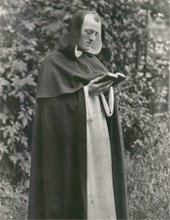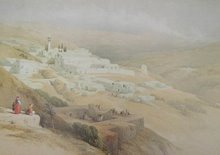On 14th April 1943, as he was drawing to the end of his seventy-fifth year, Father McNabb was told by his doctor that he had only a short time to live. That same day he wrote to his niece, Sister Mary Magdalen, a Dominican sister, “Deo Gratias! God is asking me to take a journey which everyone must sooner or later take. I have been told that I have a malignant incurable growth in the throat. I can, at most, have weeks to live.” The following day he preached to the Sisters of Mercy. It was Thursday in Passion Week, and, after a few vivid words of reflection concerning the imminence of the Passion and Death of Our Lord Jesus Christ, Father McNabb said:
“And now dear sisters, I have some very good news for you. This is the last time I shall be speaking to you together in this chapel. You know in these days everyone is being called up [this of course was in the midst of World War II] ... I too have been called up!... And for what? To the King of Kings, and that not for the duration but for Life Everlasting! The words of the Psalm, ‘Rejoice at the things that were said to me - with joy I have entered the House of the Lord’, are filling my heart with joy.”
It was to be approximately nine weeks before Father McNabb finally died - and these last two months were as busy a period for him as any that had gone before. He carried on his teaching courses on Aquinas and the Psalms, even offering to start a course on the Angels for as long as he lasted: “I do not now what sort of Angels they will put me amongst, dear children! I am not good enough for the good Angels.” He warned his students that at any time he may have to send them a telegram to say that he was dead.
When the press - Catholic and secular - found out that such a popular figure was about to die they hounded the Dominican Community at St Dominic’s Priory. Father McNabb was determined that his death should be as much a sermon as his life as a Dominican had been. He knew that the last weeks would be difficult. He had been told that he would effectively die slowly of starvation, and may well experience some severe breathing troubles, as the passage of his throat narrowed and finally disappeared. While his strength was still with him he continued to preach and speak across London, marching along its dreary streets in his habit and hob-nailed boots with his heavy ‘McNabb-sack’ over his shoulders. He went to all his choir duties until a few days before his death: although he was able to speak to the end, and his breathing problems were slight, he was not able to eat for about a week, and could not swallow any liquids for three days, before he died. In the end, he collapsed one morning at Prime, on Monday 14th June: he experienced a slight recovery and wrote his last letter, again to his niece, Sister Mary Magdalen. The next day he received the Last Rites and slowly deteriorated until the morning of Thursday 17th June when he summoned Father Prior to his cell (under obedience he was seated on a straight-backed chair - they didn’t dare suggest to him that he should take to his bed!). There, amidst the bare surroundings of a familiar austerity, Father McNabb sang the Nunc Dimittis for the last time, confessed his sins to Father Prior, and renewed his vows. He then became unconscious for half-an-hour, sneezed, and died.
Crowds of people, young and old, rich and poor, but especially old and poor, came to see him, pray for him, and touch his habit as he was laid out in the Lady Chapel at the Priory for three days. The Requiem Mass took place on Monday 21st June: the Church was packed, principally with Catholic luminaries - the streets outside were thronged with the poor from the tenements he had so often visited. As requested, he was buried in a plain deal box, marked with a simple black cross: it was drawn on an open-backed wagon to Kensal Green Cemetery to where amidst even more crowded scenes Cardinal Manning had been carried almost half-a-century before. The newspapers were full of stories and details about his last few days, his death and his funeral. Truly, his last sermon, his death, was what reached his greatest audience. As his Prior, Father Bernard Delaney, said at his funeral:
“All that he [Father McNabb] said, all that he did, all that he was, were the expression of his burning love for his Master, Jesus Christ Our Lord. The cause of God was his consuming passion - the glory, the justice, the truth of God. He was a great Friar Preacher, but he was something more - he was a living sermon.”
There is much more that could be said about Father McNabb. His work for the social reign of Our Lord Jesus Christ was great: he touched many, many souls, and after his death a small movement started for his beatification. It got nowhere, despite several significant endorsements, largely because his own Dominican family was in two minds about him. Whereas those who perhaps saw less of him considered him a saint, several of his brother friars thought him a play-actor, a rigid and harsh ego-maniac who craved attention and utter obedience. Many of the friars with such negative views appear to have suffered under his authority when he was Prior of Hawkesyard and they were his charges many years ago.
This sense of division comes across in the only (pseudo-)biography of Father McNabb, written by a Dominican pupil of his, Father Ferdinand Valentine (one too young to remember those gruelling Hawkesyard days), who grew from hero-worship to perplexed uncertainty as he wrote the book and encountered views of the man that differed markedly from his own. The greatest asset of this book - more a slightly hysterical quasi-psychological poly-conjectural study of the man than a proper biography or examination of his work - is the appendix which contains a wealth of letters and testimonies that make up over a quarter of its pages. Sadly, Father McNabb has suffered under the pall of this book for many years. In 1996, The Chesterton Review bravely brought out a very useful if rather ambivalent special issue devoted to him: aside from this the only other book dealing with him was one full of peculiar admiration written by E A Sidermann, one of his chief hecklers at Speakers’ Corner and an atheist to boot.
Although some aspects of Catholic social teaching which he championed would certainly be enthusiastically cheered by elements amongst the ‘typical’ May Day anti-capitalist and anti-globalization protesters, and some aspects would be limply applauded at ghastly Justice and Peace hand-holdings across the country by the polo-necked pseudo-Dominicans who sadly even today sometimes pass for St Dominic’s sons, much of what Father McNabb stood for - integral, upright, unapologetic, strong, fervent Catholicism - is of course now out of favour. There can be no doubt that Father McNabb would have been desolated by what passes for Catholicism in so many churches up and down the country, across the world, indeed, today. He would have prescribed as its antidote an apostolate of Catholic Action, but only if it were founded on a strong and well-anchored spiritual life. He knew that our lives - well-lived - would accomplish more than our words.
I will conclude this piece with some more of Father McNabb’s words, and with a prayer of his:
“Some people say, ‘I do not like sermons . I never go to hear a sermon.’ They do not know that these very words are themselves a sermon. They do not realise that every deed done in the sight or hearing of another is a preached sermon. The best or the worst of all sermons is a life led. God made every man and woman an apostle when he made them capable of dwelling with their fellow men and women. The best argument for the Catholic Church is not the words spoken from this pulpit but the lives lived in this Priory and in this parish. We should measure the words by the life, not the life by the words.”
“Bend my stubborn heart, my Master, make my lips truthful. May my prayer be a prayer of truth as well as a prayer of petition. May I desire what I say I desire; and may I desire as first what Thou hast put first, at the head of all our desires - Thy Will, Thy Kingdom, and the hallowing of Thy Name.”


2 comments:
Thanks for your very wise and informative article.
I’d like to ask you to make two clarifications:
1. Could you elaborate on this fragment: “the Government was itself was in the face of war to encourage a return to the land, so as to increase agricultural produce from a degraded and untended land.”? What kind of war (with whom? an internal conflict?) do you mean?
2. When you describe Fr. McNabb’s death you write: “He then became unconscious for half-an-hour, sneezed, and died.” What does “sneezed” mean in this context? “To expel air forcibly from the mouth and nose in an explosive, spasmodic involuntary action resulting chiefly from irritation of the nasal mucous membrane.” – as the dictionary definition goes? Or maybe something of a hiccup or sigh kind?
I almost treated the first question seriously until I read the second.
Ahem.
Post a Comment